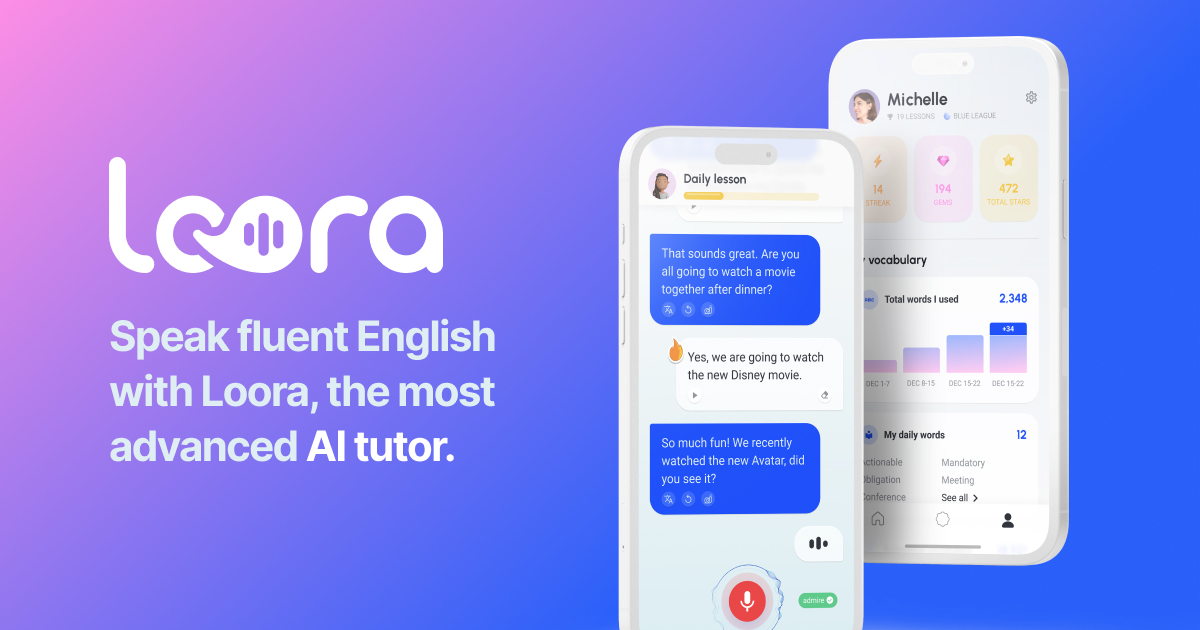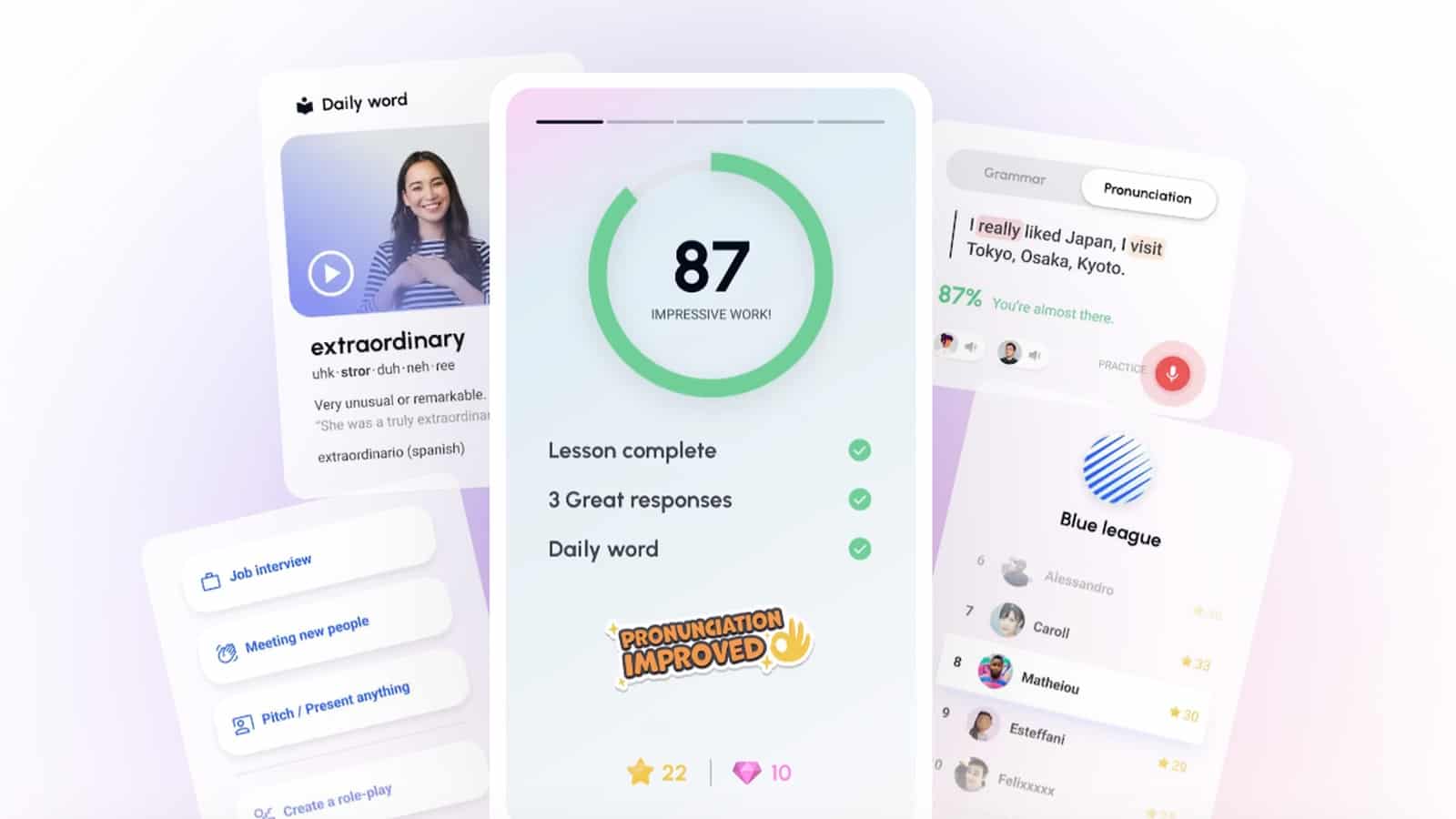Of the professions in danger of being replaced by AI, language teacher is certainly up there.
That’s not necessarily because it’s a good idea. AI, some employers have decided — including Duolingo, recently — is a reasonable enough stand-in for human experts when it comes to language instruction. Despite the fact that AI-translated text tends to be less lexically rich than human translations, the cost savings are attractive enough to make the trade-off worth it in certain managers’ minds.
But some companies argue that AI can do at scale what language teachers can’t.
One of those is Loora, which leans on conversational AI to teach English to students. Founded by Roy Mor and Yonti Levin, Loora’s iOS app has users chat with a chatbot that gives feedback on their English comprehension.
“The idea for Loora [came from] our frustration with language learning,” Mor told TechCrunch in an email interview. “Language learning apps are only geared toward beginners or casual learners, and human tutors are very expensive, inconvenient and have limited availability.”
Loora, whose namesake is the Arabic word for “language,” offers learners several AI-generated conversation subjects and scenarios to choose from, from sports, tech, business, fashion, books and TV shows to interviews and presentations. The app provides feedback on grammar as well as pronunciation and accent, and — if users get stuck — a direct translation in their native tongue.

Image Credits: Loora
Loora scores users on their proficiency over time, and employs this score to personalize conversations at their speaking level.
Quite a few English learning platforms offer features along those lines, including OpenAI-backed Speak, Preply (which recently doubled down on AI tech) and ELSA. But Mor claims that Loora’s different in that it’s aimed at “serious learners” trying to achieve fluency in English for personal and professional advancement.
“Most other language learning apps on the market are limited and gamified,” Mor said. “Loora has built, trained and optimized its AI for the sole purpose of enabling users to achieve English fluency — far beyond casual conversational skills … We only use our own data and bespoke training and evaluation system for training and optimizing our models, resulting in continuously-improving retention.”
Mor makes the additional case that Loora is a better fit versus other apps and tutors for specific language learning use cases — for example pitching ideas in a business meeting. Tutors, he asserts, are limited by their domain knowledge — a limitation Loora’s app doesn’t have (or so Mor claims). And speciality tutors are likely to be in higher demand than general, all-around ones, Mor adds.
“Say a learner is interested in learning to discuss business concepts at a high level for work purposes,” Mor said. “If the tutor is unfamiliar, despite being a native speaker, they’ll be poorly suited to teaching English for that specific purpose.”
That’s promising a lot considering the limitations inherent in language education apps — particularly those without an element of human feedback.
In a Michigan State University study of the effectiveness of popular language learning apps, nearly every participant improved on grammar and vocabulary but only around 60% improved in oral proficiency — a common sticking point in digital language learning programs. The study’s authors concluded that a hybrid setup — one combining online and classroom learning — was the best approach for learning and retaining second language skills.

Loora assigns a score depending on the user’s perceived English proficiency.
But this hasn’t dissuaded Loora’s investors, who might’ve been persuaded by the size of the total addressable English language learning market (over $70 billion by 2030, according to data analysis firm Research and Markets).
Loora today announced that it raised $12 million in a Series A round led by QP Ventures with participation from Hearst Ventures, Emerge and Two Lanterns Venture Partners — bringing Loora’s total raised to $21.25 million. The cash, Mor says, will be put toward funding the development of Loora’s Android app, “deepening” Loora’s core AI tech and conversational capabilities and expanding the startup’s workforce from 14 employees to 25 by the end of 2024.
Loora also intends to launch an enterprise service, broadening beyond its current customer base of 15,000 app users. (Loora charges $15 per month or $120 a year for access to its app.) While the startup’s consumer business has been expanding steadily — 8x in 2023, in terms of annual recurring revenue — Mor sees a growth accelerator in corporate clientele.
“Our planned business-to-business offering will see Loora available through employers, universities and institutions, making it increasingly accessible to those who want and need it most,” Mor said. “With [the Series A] fundraise, our efficient unit economics, growing customer base and the ever-present demand for English learning solutions, we believe we’re well positioned to weather any potential headwinds and continue to grow and serve our learners.”


